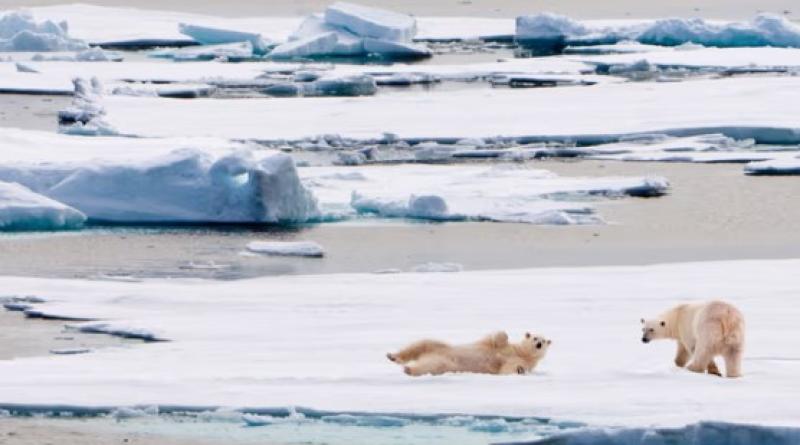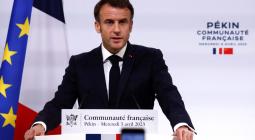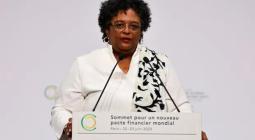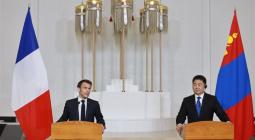Emmanuel Macron pledges €1bn to fund research into melting ice caps

The French president has called for action at a climate summit in Paris attended by heads of state and scientists before Cop28
France will spend €1bn (£880m) on polar research between now and 2030, amid rapidly rising scientific concern over the world’s melting ice caps and glaciers.
A new polar science vessel will spearhead the effort, and France is calling for a moratorium on the exploitation of the seabed in polar regions, to which the UK, Canada, Brazil and 19 other countries have so far signed up.
French president Emmanuel Macron told a summit of heads of state and scientists in Paris: “We are not talking about a threat for tomorrow, but one that is already present and accelerating. We are talking about a transformation of the cryosphere [the Earth’s ice] that already threatens millions and will threaten billions of the planet’s inhabitants with multiple direct and indirect consequences.”
The plight of the Earth’s polar regions and glaciers has sparked alarm among many scientists, as heatwaves at both poles, which were seen for the first time last year, look set to be a regular occurrence.
This year is already the hottest on record and probably the hottest in 100,000 years, with ocean temperatures so far above normal as to be, in the words of one scientist, “gobsmackingly bananas”.
The Earth’s ice caps reflect much of the sun’s light back into space, known as the “albedo effect”, and the melting ice leaves dark sea that absorbs more heat, making the disappearing ice a potential tipping point for the climate that would cause a rapid increase in heating. John Kerry, the US special presidential envoy for climate, did not attend the Paris summit but sent a video message in which he warned of the consequences. “We must understand the tipping points, the points which there is no reclaiming, there is no coming back,” he said.
Some scientists now believe that only drastic measures can avoid the worst. Among them is Sir David King, former UK chief scientist, and now head of the Centre for Climate Repair at Cambridge University, who is researching ways to refreeze the Arctic ocean.
Macron called the high-level meeting of heads of state from countries with polar territory or that have glaciers, accompanied by leading scientists, in Paris on Friday.
They heard from polar and glacier experts that temperatures were rising four times more rapidly in the Arctic than the global average, half the world’s 200,000 glaciers were set to disappear by the end of the century and that the rate of sea level rise had doubled in the last two decades.
Pam Pearson, founder and director of the International Cryosphere Climate Initiative, a thinktank, warned of the urgency: “Politicians think that the ice is far away. The ice does not care. It will continue melting until carbon dioxide levels stop rising and come down. But they are still rising just as fast as they were 20 years ago. Scientists are screaming that this is insanity.”
Macron, seated opposite her, looked grave, as Pearson, who spent 20 years as a US diplomat working on conflict and geopolitical concerns, continued: “I know that climate change is seen as a soft issue [compared with wars and national security]… but we can’t negotiate with the melting point of ice.”
France, which is home to glaciers in its Alpine departments, and has territory and a science base in Antarctica, has taken a leading role in pushing for agreement at this year’s UN Cop28 climate summit in Dubai, which starts at the end of this month. Macron also hosted a summit focused on climate finance in June,where he joined the prime minister of Barbados, Mia Mottley, to call for trillions of dollars of investment in the developing world.
Glaciers were melting across the world, warned the head of the World Meteorological Organisation, Petteri Taalas. As they vanish irrecoverably, more than 1 billion people who depend on them for water and agriculture will face increasingly severe shortages. As well as cutting greenhouse gas emissions overall, there are also urgent measures that scientists believe could be taken now that would reduce or delay the risk of the collapse of glaciers or a tipping point at the poles.
Soot, for instance, is a significant problem in the melting of ice. Also known as black carbon, it is a byproduct of combustion that stains the ice and has a darkening effect that causes more heat to be absorbed. Large, miles-long streaks of soot on Arctic ice are now clearly visible from aerial images. Scientist say cleaning up air pollution by stopping burning coal would have an immediate impact on soot and could halt or delay a substantial amount of melting. Another focus is methane, a greenhouse gas 80 times more powerful than carbon dioxide in its warming effect, but which breaks down much faster in the atmosphere. Scientists calculate that reducing methane, soot and other “short-lived climate pollutants” could slow warming by 0.24C by 2050.
Methane is expected to be one of the areas of focus at the forthcoming Cop28 UN climate summit. Some experts are pushing for the hosts, the major oil and gas producer United Arab Emirates, to try to broker a deal with other major oil producing countries and companies to reduce the leakage of methane from fossil fuel operations.
Photograph: Steve Bloom Images/Alamy - Polar Bears on an ice floe in Svalbard, a Norwegian archipelago in the Arctic Circle.





